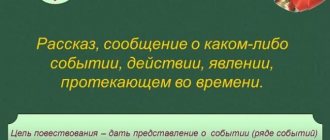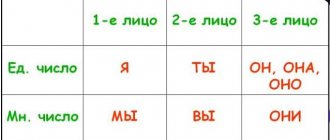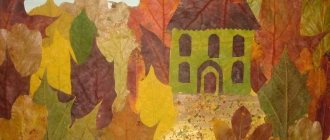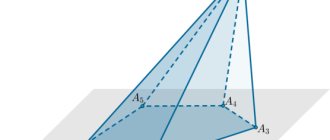Complex text analysis in 7th grade on the topic “Adverbs”
Comprehensive text analysis
(repetition of the topic “Adverbs” for grade 7)
Compiled by teacher
Russian language and literature
MCOU Novozhiznenskaya secondary school
Shirobokova V.V.
My mother got up early, before the sun. One day I also got up before the sun to set a snare for quails at dawn. Mother treated me to tea with milk. This milk was boiled in a clay pot and covered with a rosy foam on top, and under that foam it was (un)usually tasty and it made the tea wonderful.
This treat changed my life for the better: I started getting up before sunrise to drink delicious tea with my mother. Little by little, I got so used to this morning getting up that I could no longer sleep through the sun.
Then in the city I got up early, and now I always write early, when the whole animal and plant world awakens and also begins to work (in) its own way.
And often (often) I think: what if we rose with the sun like this for our work! How much health, joy, life and happiness would come to people then!
After tea I went hunting for quails, starlings, nightingales, grasshoppers, turtle doves and butterflies. I still (didn’t) have a gun then, and even now a gun is (not) necessary in my hunt.
My hunt was then and now - in finds. I had to find something in nature that I had not yet seen, and, perhaps, no one else had (had) encountered in their life.
- Read and title the text.
___________________________________________________________
- Insert the missing letters, open the brackets, and add the missing punctuation marks.
- Determine the style and type of speech.
__________________________________________________________________________________________________________________________
- Determine the topic of the text.
_______________________________________________________________________________________________________________________________________________________________________________________
- Determine the main idea of the text.
________________________________________________________________________________________________________________________________________________________________________________________________
- Write out the adverbs with hyphens.
_______________________________________________________________________________________________________________________________________________________________________________________
- Perform morphological analysis of the adverb early.
- Parse the sentence and make a diagram:
After tea I went hunting for quails, starlings, nightingales, grasshoppers, turtle doves and butterflies.
____________________________________________________________________________________________________________________________________
so UNT / Lesson developments / Russian language lessons
Lesson-trip on the topic: “Adverb”
01.09.2014 6080 1094
Goal: repeat what you have learned about the adverb.
Objectives: 1) Systematization and generalization of knowledge on the topic “Adverb”.
2) Development of skills and abilities to determine the grammatical features of adverbs and their use in speech, highlighting spelling patterns.
3) Fostering interest in the Russian language and patriotic feelings.
Lesson type:
generalizing
Methodical forms and techniques:
collective, individual, staging, training exercises.
Equipment:
multimedia projector, screen, computer, monitor, textbook.
Epigraph for the lesson:
Treat your native language with care and love. Think about it, study it, love it passionately, and a world of boundless joys will open up to you, for the treasures of the Russian language are limitless. (Slide 2).
(Lugovskoy)
Presentation attached.
During the classes
I. Opening remarks
Dear Guys! We have finished studying adverbs, we have learned a lot about adverbs, and today in class we will repeat and generalize this knowledge. And we will do this by traveling around the country “Adverb”. The epigraph for the lesson is taken from the words of the poet Lugovsky (the epigraph is read out). Of course, you need to protect and love your native language. Is it possible to love parts of speech? This question will seem strange to you. Indeed, you can love family and friends, books and cities, ice skating and swimming, but it is impossible to have feelings for a prefix or fall in love with an adverb. Don't rush to conclusions. An adverb can rightfully say about itself: “Not a single dictation, not a single story can be done without me, I help characterize the object, the action, and the sign.” And so it is. Even in the words of the poet Lugovsky, which became the epigraph for the lesson, there are adverbs. Name them. (carefully, lovingly). Let's listen to a story about the role of adverbs in a work of art.
1)
The student reads and analyzes the text:
(Slide 3).
A strong, iridescent, ringing cry suddenly rang out above us and was immediately repeated a little ahead. Large, beautiful birds flew in a triangle, sharply and rarely flapping their convex wings. With their heads and legs stretched out tightly, their chests thrust out steeply, they rushed uncontrollably and so fast that the air whistled around them. It was wonderful to see at such a height, at such a distance from all living things, such an ardent, strong life, such an unwavering will. Without ceasing to triumphantly cut through the space, the cranes occasionally echoed with their advanced comrades, with the leader, and there was something proud, important, something indestructibly self-confident in this conversation under the clouds. (I.S. Turgenev)
In this text, the writer used 17 adverbs, 16 of which relate to verbs and gerunds, and only one to an adjective. And this is no coincidence. It was important for the writer to convey the actions of birds in flight and, with the help of adverbs, to characterize these actions more accurately and expressively. Adverbs give completeness and clarity to speech.
Writer Maxim Gorky said about adverbs: “The Russian language is unusually rich in adverbs that make our speech precise, figurative, and expressive.” (Slide 4).
2)
Teacher:
Today we will take a trip to the amazing country of Adverb. And your classmates will help us get to this country. (Staging of the story “Either a fairy tale, or a true story.”)
(Slide 5).
Either a fairy tale or a true story
After class, the teacher left the Russian language textbook on the table and went home. At night, little people crawled out of the book. These were parts of speech. A real debate broke out among them about which part of the speech is the best, the most difficult and the most interesting.
“I am the most difficult part of speech and the most interesting,” said the Adverb. – I give completeness and clarity to speech. And I can also form using prefixes and suffixes and even addition, as in mathematics.
And then, with a terrible screech, a noun flew forward and began to be indignant:
How dare you be so proud! I believe that I am the most charming and attractive part of the speech.
Sorry,” said the Verb, “but, in my opinion, I am the most difficult part of speech!”
No, no,” Adverb blushed with anger. Do you know how to write an adverb of force? And the adverb for a moment? Why is the adverb "on the fly" and "on the run" written separately, but "blindly" written together? Only the Explanatory Dictionary can understand our dispute.
But there was no dictionary: he was invited to tea at the Encyclopedia, and without a smart dictionary no one could resolve this dispute. Parts of the speech were already ready to enter into a fight, but suddenly the first ray of sun fell on the book, and the disputants fearfully hid in their places.
3)
Teacher:
After this fabulous story, I think that somewhere there is a country called Adverb, and to get there we have to make stops at 7 stations. Stations - spellings, rules. So, is everyone ready to hit the road? Then go ahead! (Slide 6).
II . Repetition of the topic “Adverb”.
1 station.
(Slide 7). We arrive at the first station “Adverb as a part of speech”.
Who will be the guide? (The student who volunteered to be a guide talks about this station)
- What is called an adverb?
- How do adverbs change?
- Which part of the sentence is most often found?
On the desk:
Joyful, brave, spring, distant, bottom, distance, third, two, yours.
Exercise:
form adverbs. What parts of speech did you form adverbs from? In what ways are they formed?
2nd station.
(Slide 8). Next stop is at a station called “Degrees of Comparison”.
Presentation by the next guide.
— What two forms of degrees of comparison can adverbs have?
— How to distinguish an adverb in the comparative degree from an adjective in the comparative degree?
Write down phrases from dictation, find adverbs in the comparative degree and adjectives in the comparative degree, sign them.
Look younger, sister younger; the voice became louder, spoke louder; my brother is taller than me, he jumped higher.
3rd station.
(Slide 9). Let's move on. Ahead is the station “Not with adverbs ending in –O and –E.” Presentation by the next guide.
— When is Not with adverbs ending in – O and – E written together, and when separately?
— Write down examples yourself for all cases of writing Not with adverbs.
Underline the spellings.
Together or separately? (Do (not) skillfully; sew (not) tightly; do (not) carelessly; fly (not) high; do (not) neatly; look (not) trustingly, but with suspicion; speak not at all (not) fun; at all ( not) loudly; far (not) affectionately; say (not) loudly, but quietly.)
Station 4
“Individual work”. (Slide 10). While the linguistic warm-up is going on, two people prepare answers using cards.
No. 1 – O or E? (Melodious..., fresh..., strong..., hot..., good..., general..., clumsy..., brilliant..., yet...)
No. 2 – O or A? (Left..., long ago..., right..., full..., first..., again..., frightened..., properly..., trusting..., left...)
Competition "Savvy".
(Slide 11).
Fill the table vertically with adverbs of different semantic groups.
5 station.
(Slide 13). We arrive at the “Adverbs with a hyphen” station.
On the desk:
Firstly, secondly, in a friendly manner, truly, somehow, someday, firmly.
- Open the brackets and explain when a hyphen is written in adverbs, identify the morphemes with which these words are formed. (One student at the blackboard).
6 station.
(Slide 14).Next stop at the station “b at the end of adverbs”.
On the desk:
Married(?), completely(?), wide open(?), supine(?), backhand(?), galloping(?), unbearable(?)
Write down, indicating the conditions for using and not using the letter ь at the end of adverbs after hissing ones.
— Explain how you understand the lexical meaning of the words BACKWARD and BACKHAND. (Slide 15).
On the board (closed): Supine - face up, on your back, on your back. Fall backwards.
Backhand, swinging, forcefully moving your hand away from you. Hit backhand.
7 station.
(Slide 16). We arrive at the last station “Literate”.
The obstacle will be overcome if the adverbs are written without errors. If not, the penalty task is morphological analysis of the adverb.
III. Bottom line. Assessment.
IV.
Generalization. (Slide 18).
- So we arrived at the last station, the journey ended.
— Which stations did we visit and what did we repeat?
Continue the sentences:
Ø In this lesson I realized...
Ø During this lesson I remembered….
Ø In this lesson I remembered….
Ø I will never make a mistake...
V. Homework:
exercise 252. Write a miniature essay about how people influence nature.
Thanks for the lesson!
(slide 20).
See the downloadable file for the full text of the material.
The page contains only a fragment of the material.
Comprehensive text analysis. Adverb educational and methodological material on the Russian language (grade 7) on the topic
Fill in the missing letters and punctuation marks, open the brackets.
__________________________________________________________
The convoy was located away from the village... near the river. So...the night burned (like) yesterday3 the air was (stationary) and dull. From the heat (n...) where could I go. There were (not) many willows standing on the river, but their shadow was across the field... but fell into the water. In...yes in the river, turning blue from the reflection of the sky...passionately...but beckoning to itself.
Dymov and Kiryusha quickly rejoiced and fell into the water with a loud scream. The quietly gurgling river erupted into a snorting, splashing, scream. Yegorushka was happy. Running, he jumped from a height into the river. Having described (in) the air... an arc, Egorushka plunged deeply (into) the depths of the river... but (didn’t) reach the bottom. Some kind of force grabbed him and took him back (to) the top. He emerged snorting and blowing bubbles. Yegorushka swam to the shore and began to rummage around the reeds.
(According to A. Chekhov)
Complete the tasks.
- Title the text.
- Determine the type of speech.
- Determine your speaking style.
Fill in the missing letters and punctuation marks, open the brackets.
__________________________________________________________
The convoy was located away from the village... near the river. So...the night burned (like) yesterday3 the air was (stationary) and dull. From the heat (n...) where could I go. There were (not) many willows standing on the river, but their shadow was across the field... but fell into the water. In...yes in the river, turning blue from the reflection of the sky...passionately...but beckoning to itself.
Dymov and Kiryusha quickly rejoiced and fell into the water with a loud scream. The quietly gurgling river erupted into a snorting, splashing, scream. Yegorushka was happy. Running, he jumped from a height into the river. Having described (in) the air... an arc, Egorushka plunged deeply (into) the depths of the river... but (didn’t) reach the bottom. Some kind of force grabbed him and took him back (to) the top. He emerged snorting and blowing bubbles. Yegorushka swam to the shore and began to rummage around the reeds.
(According to A. Chekhov)
Complete the tasks.
- Title the text.
- Determine the type of speech.
- Determine your speaking style.
Fill in the missing letters and punctuation marks, open the brackets.
__________________________________________________________
(C)at first they walked for a long time along the r...vnin.... There was no trace of the green….deep mountains overgrown…x l…themselves (h, s) here. The mountains began (from) the left (un)expected (n, nn) about a sheer... rise... to rise somewhere (to) (to) up. Wind, water and just the past centuries (not) did a little work on it. In many places, layers of different...colored stone (un)thought...mo p...r...koshe(n,nn)y and i...lom(n,nn)y were clearly visible. (In some) places they mentioned a cameo (n, nn) cla...ku.
St...sm...arrowed to the north and the sun (n...)when (didn't) shine on it. The border of eternal snow descended no... and (for) a long time before it, the... roar... I r...deli then completely dropped... off. There was a (barely) barely noticeable road under the wall. She (apparently) tried (not) to press herself (in) tightly to the wall. But stubborn life still took its toll everywhere. Even along the station itself there were no tenacious bushes that had grown from the... carried (n, nn)s (from) the wind or birds.
(B)gave d...horns to...b...ran (to) the top of the mountain following and...the bends of the cameo(n,nn) slope.
(According to M. Semyonova)
Complete the tasks.
1. Title the text.
2. Determine the type of speech.
3. Determine your speaking style.
Fill in the missing letters and punctuation marks, open the brackets.
__________________________________________________________
I (for) a long time... remember this clear (like) weight (n, nn) and warm (like) summer day. (In some) places there are already (barely) barely noticeable green... drains. The city looked (new) Firstly, it was (slightly) slightly blowing in the... grater, secondly, almost all the windows were completely... covered..., thirdly, the sun... was holy (royally but (not) hot ... but affectionately (in) a kind way. There were (apparently) invisible sparrows on the paths and they (still) scurried (up) and (down) as before.
But (didn’t) expect (n, nn) the sky was sweating... it was getting dark. (Not) careless... (not) sloppy... the chattering clouds popped up. (B)began...m...a (not)bright lightning flashed and cut (in)two the (dark)gray sky. Then the birds were frightened by a strong clap of thunder like a boom... somewhere somewhere someone (in) shattered ra... was breaking glass (n, nn) dishes.
And the rain poured (exactly...) into (exactly...) the curtain... fell (on) the ground and covered everything (in) around. The city disappeared (somewhere) and along the streets there were muddy streams of water.
It rained for a long time and in the morning the washed city looked (very) praz... nothing... n... mu weight... l....
(According to A. Illuminatorskaya)
Complete the tasks.
1. Title the text.
2. Determine the type of speech.
3. Determine your speaking style.
Fill in the missing letters and punctuation marks, open the brackets.
__________________________________________________________
The guys... climbed up the steep slope of the mountain completely... dotted with (nnn)... mu to... mnomies. (C) right... and (c) left... plumb line... but in... the black walls were smoking. (Up) in the...daylight there appeared a faint sliver from...the empty sky. In the gorge... it was s... f... but soon the boys became hot. They, breathing heavily, stubbornly walked (in) front of the... r... trying (for) to get to the camp.
“Watch out, guys!” - Nikita (un)expectedly shouted. A thick snake with shiny scales slid (towards) the boys. A (few) steps away from them she froze, then (slightly) swish...in...swept her tail in...threw her head and, opening her pink mouth, began to shush...sing...swinging her head. Ra...double (n,nn) tongue...towards her...soundingly rushed into the paste....
Nikita threw a stone at the snake. She rushed like an arrow towards him... well. He (barely) barely had time to…run. The guys, stumbling and falling, rushed (into) the mud... but it was (not) easy to press on the... mnemies. And the snake (wasn’t) going to…follow them.
Oh...breathing friends (s)new...began to punish...kat...sya (in)up.
(According to V. Gubarev)
Complete the tasks.
1. Title the text.
2. Determine the type of speech.
3. Determine your speaking style.




